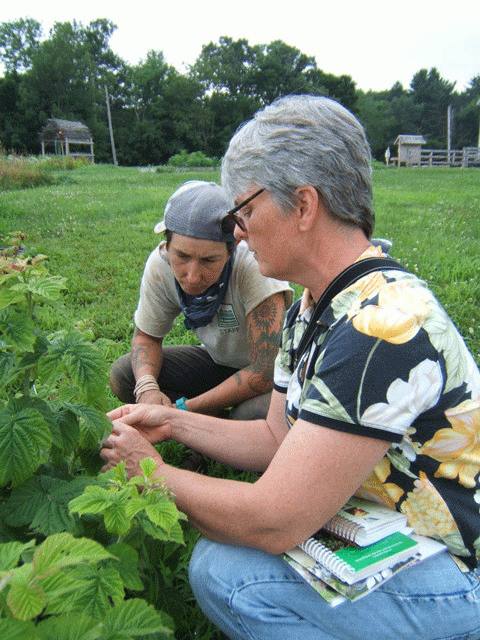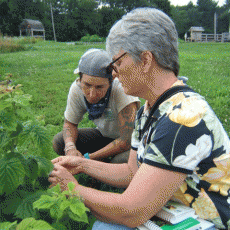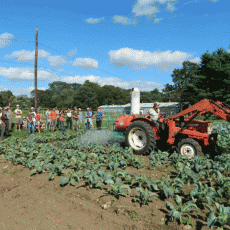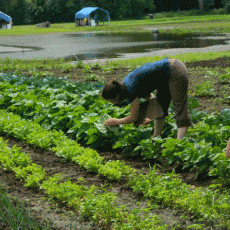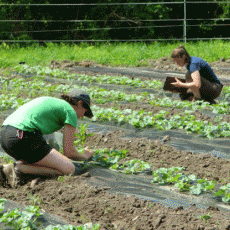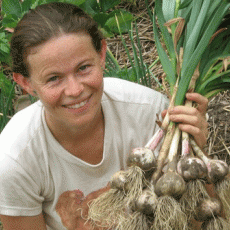Since its beginnings early in the twentieth century, UMass Extension has always brought new methods, new research, information and best practices to farmers across Massachusetts. Today, UMass Extension continues this tradition by reaching out, finding and training growers across the Commonwealth about methods in Integrated Pest Management (IPM). In the spirit of educating farmers whose boots are quite literally “on the ground,” the trainings take the form of a personal program with strong hands-on face-to-face opportunities for learning, not too different from the “old-fashioned” Extension work for which Mass. Agricultural College (“Mass Aggie,” the predecessor of UMass Amherst) and what was originally called the Massachusetts Cooperative Extension Service were well-known in their early days. IPM is an effective, environmentally friendly approach to pest management that relies on a combination of commonsense practices: pests are managed through prevention, avoidance, monitoring and suppression.
UMass faculty and staff involved with this on-farm Extension IPM training include Extension’s vegetable team (with Ruth Hazzard, Rich Bonanno, Katie Campbell-Nelson, Susan Scheufele and Lisa McKeag) and its fruit team (with Hilary Sandler, Sonia Schloemann, Arthur Tuttle and John Clements). The teams regularly visit about 14 farms a year across the state from May through September.
A major component of the training is to “scout” for pests, training growers to set traps, and use forecasting models and on-farm weather stations to determine appropriate treatments. Scouting programs entail UMass faculty and staff visiting farms and training farmers on both tried-and-true and new scouting methods. Growers are also given nutrient management assistance through lab analysis of soil and tissue samples and then through farm specific recommendations on amending their soil in order to produce the healthiest plants while avoiding nutrient leaching.
Participation is solicited across the state through notices in newsletters, relevant publications and by word of mouth. Specific agreements for farmer participation include a willingness to meet every two weeks on farm and they must be amenable to hosting a Field Walk or Twilight Meeting on their farm. In return, farmers receive training through this program, free of charge. One particular focus of the two teams’ efforts is to reach beginning farmers.
Throughout the program, UMass faculty and staff are able to assist growers with many of the challenges they experience on their farms. The learning often involves ways to decrease pesticide use as well as methods to institute organic controls effectively such as through correct sprayer calibration.
Field trials are conducted on-farm or at a University research farm to provide growers with more information. For example, several farms have participated in a biocontrol trial to manage the Mexican Bean Beetle by introducing the pediobious wasp that parasitizes larvae of Mexican Bean beetle, thereby ridding the farmer of a pest without using chemicals. Sonia Schloemann, Extension educator with expertise in fruit crops, shows farmers how to construct simple traps to monitor Spotted Wing Drosophila (a recently-introduced species of fruit fly). This species is particularly damaging because it has serrated ovipositors that can lay eggs in even unripe fruit leading to crop losses.
Evaluations of this program have been overwhelmingly positive. Comments from participants include: “Overall this season I have appreciated the time you took to walk around the fields with me to focus on pest and disease control. You took the time and supported a culture of learning on the farm,” “I have learned that with bacterial disease, I still have to take steps to stop it from becoming established in seed,” and “Now I spray by education, not by panic or intuition.”
This program is supported by a USDA “specialty crops” grant. The funding was first received in 2010-2013 and has been renewed for 2014-2016. The project in 2010-2013 included funding for bedbug research and the tick diagnostic lab as well as fruit and vegetable team IPM training on farms. The 2014-2016 funds are for the fruit and vegetable teams focusing on diversified fruit and vegetable farms common to Massachusetts.
